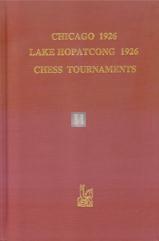Buffalo 1901 and 1894 Chess tournaments
Hilbert John S.

The two tournaments Buffalo 1894 and 1901 hitherto have remained obscure even though the brightest American chess star of that day, Harry Pillsbury, was a contestant in both. In addition, Pillsbury`s chief rival in those days, Frank Marshall, was a contestant at Buffalo 1901, though in such poor form that he finished only fifth out of six players.
Description
Publisher`s Foreword
The two tournaments Buffalo 1894 and 1901 hitherto have remained obscure even though the brightest American chess star of that day, Harry Pillsbury, was a contestant in both. In addition, Pillsbury`s chief rival in those days, Frank Marshall, was a contestant at Buffalo 1901, though in such poor form that he finished only fifth out of six players. In fact, Marshall only escaped the ignominy of finishing last by winning both games over a talented amateur, Karpinski, who later went on to a very successful career in mathematics. Marshall`s score at Buffalo 1901 and that of Pillsbury have almost uniformly been reported erroneously, as the author`s meticulous research shows.
The ohter contestants at Buffalo 1901, Delmar, Napier, and Howell, all played an important role in the chess history of that time in the United States. Delmar was by then an old lion at the end of his career, while Napier aund Howell were very strong young players whose presence on the world chess stage was never very prominent because they chose other primary careers in preference to chess.
Allthough neither of these tournaments are among the strongest held in the United States, each has a special significance in being a training groundfor most of the best American players of that day. Buffalo 1894 was an important training event for Pillsbury, who only a year later won one of the greatest tournaments of all time in dramatic fashion over the world`s very best including World Champion Lasker. It is always interesting to see how young players of enormous talent can apparently increase their capabilities by several hundred Elo points in such a short time.
The author, John Hilbert, has done a superb job in resurrection both these tournaments from all known sources. Only one Buffalo 1901 game remains unfound, as does one game of double-round top section to the Buffalo 1894 tournament. In addition to his exhaustive research on the tournaments, he provides biographical and background material of great interest, especially to American chess aficionados.
To date no one has come close to writing a definitive history of chess in the United States before 1900. If an adequate work of that sort were to be done, Hilbert has pointed the way by his thorough coverage of source material in the newspapers and magazines of that era. Newspaper research is very tedious and time consuming, yet most of the details are in those sources along with the erratically appearing chess periodicals, which seldom gave accurate dates for chess events and relatively few scores. The tournament books for U.S. events were few and far between and often had omissions and errors along with generally low-quality notes to the games.
The notes in this book are almost uniformly those from contemporary sources except for corrections of obvious mistakes. This has the disadvantage of not providing notes equivalent to those of an Alekhine or John Nunn, but of at least giving a glimpse of the character of chess annotation of that day in newspaper sources. In addition the author has provided some notes to Pillsbury`s games from Sergeant`s book and some other more current sources.
How nice it would be if other American chess contests before 1900 were available in the same well-researched detail as these two tourneys.
Dale Brandreth - Yorklyn, Delaware, 1996.
Information
- Casa editrice Caissa Editions
- Code 4393
- Anno 1996
- Pagine p. 98 (hard cover)
 English
English
 Italiano
Italiano



